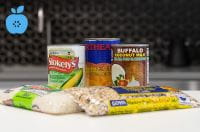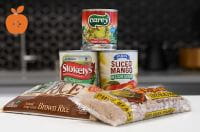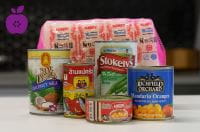Whole person care: Allina Health helps families with an immediate need of food
How the Care Meals Program works
Allina Health has more than 60 clinics across Minnesota and western Wisconsin. Many of them are stocked with care meals for any patient who tells their care team they are hungry and don’t have access to food. Typically, participating clinics give patients a questionnaire at the start of their appointment to learn if patients are having trouble paying for housing, utilities, medical bills or are dealing with food insecurity.
“Most of the time, it comes up in conversation. Once we are one-on-one, the person will tell me something like, ‘I’m almost homeless, and I’m struggling.’ That’s when I tell them we have these meals if they need them,” said Emily Mlejnek, a certified medical assistant at Allina Health Coon Rapids Clinic.
Between 2022 and 2023, Allina Health provided 4,020 care meals to patients who needed them. They choose from five different color-coded bags, which allows them to have food that fits their dietary or cultural preferences.
“Being able to provide a bag of food to individuals or families who come into the clinic, while providing them with a flyer or information about other resources just shows an extra level of care for those patients,” said Christine Weber, the program manager at Every Meal, a nonprofit with the mission of fighting child hunger.
What’s in the meals
Allina Health purchases the meals from Every Meal, thanks to donations made by Allina Health employees to its Employee Giving Fund and the Allina Health Foundation. Every Meal curates the color-coded bags:
- Yellow contains ready-to-eat items for families who may not have access to cooking tools.
- Blue meets East African dietary preferences.
- Green offers the widest variety of food items.
- Orange is tailored to Latino dietary preferences.
- Purple meets the Southeast Asian dietary preferences.





“We want to provide food that is delicious, nutritious and relevant,” added Weber. “If it doesn’t taste good, people aren’t going to eat it, right? And then what good does it do them?”
Every Meal works with more than 450 schools across the Twin Cities metro, providing as many as 12,000 food bags to students every Friday to ensure they’ll have food over the weekend. For Every Meal and Weber, working with Allina Health makes sense because their, “values align in wanting to provide food support to members of our community.”
Focusing on food access
In addition to its partnership with Every Meal, Allina Health also made charitable donations to 35 food-related organizations in 2023 totaling more than $125,000. This year, Allina Health has donated $40,250 to local food shelves during the MN FoodShare March campaign and will provide more contributions to community partners addressing food insecurity. This is just a portion of the health care system’s efforts to address the social determinants of health impacting the communities it serves. That includes food insecurity, social isolation, housing instability, difficulty paying utilities, access to transportation, and difficulty paying for medications or medical care.